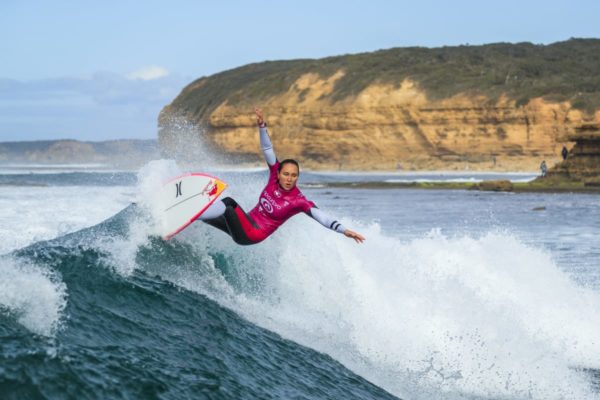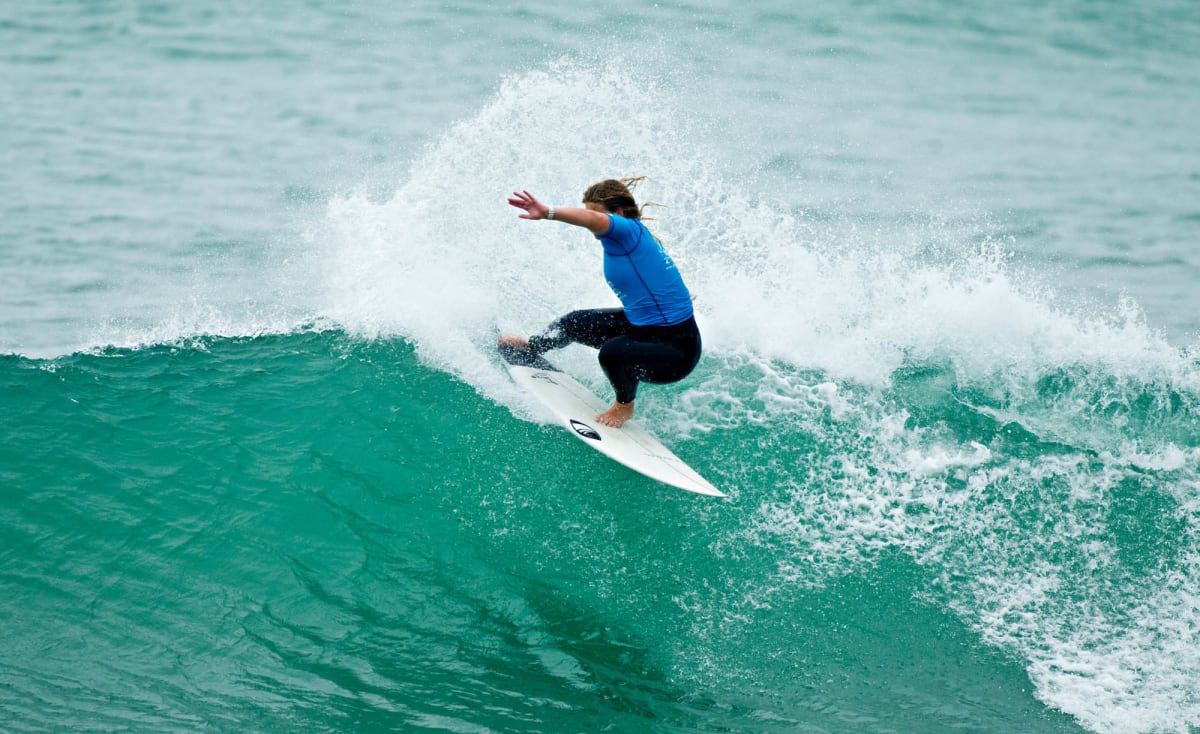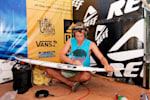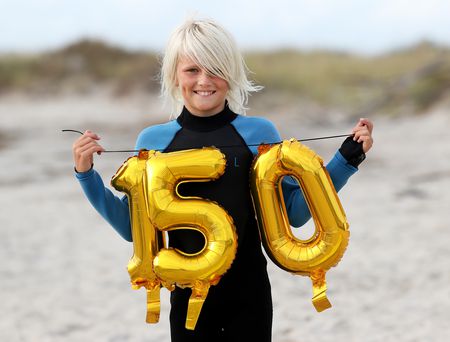LockerRoom
Young Kiwi surfers, like Aimee Brown, have a chance to nab a wildcard into the Piha Pro and compete against the sport’s legends
Great Barrier Island teenager Aimee Brown is one big break away from competing with her idol, Hawaiian surfer and world number one, Carissa Moore.
That’s a major part of what’s driving Brown to win a wildcard for next week’s Corona Piha Pro, one of the biggest professional surfing events to ever hit New Zealand’s shores.
Moore is a true legend of the sport. A four-time world titleholder – at 18, she was the youngest ever surfing world champ – she’s a bright and bubbly ambassador for the sport and a crusader for the environment. She’s also had a day named after her in her home state of Hawaii.
The World Surf League Challenger Series event in Piha is one of the few main events Moore will compete in this year, after the 27-year-old announced she was taking a break.
“I look up to Carissa for her surfing and as a person,” says Brown, who was last year’s New Zealand surfing champion.
“When I heard she was coming to Piha, I was like ‘Wow, I have to get into the main event just so I can verse her’.”
Brown – who learned the sport from her dad in the pristine surf of Great Barrier Island in the Hauraki Gulf – has another incentive to win one of the two women’s wildcards up for grabs at the New Zealand trials at Piha on Sunday. It would also be a major step towards her ultimate goal – a spot on the World Surf League’s Championship Tour.
“I’m pretty excited about the trial – it’s a huge opportunity to get a chance to go up against the world’s best,” the 19-year-old university student says. “It’s going to be tough, but cool, and I’m sure we will all be stoked for whoever gets the spots in the main event.”
The wildcard winners will join Kiwis Paige Hareb and Ella Williams in the week-long main event.
The Piha Pro is part of an inaugural World Surf League (WSL) Challenger Series, where over 100 surfers are given the opportunity to qualify for the Championship Tour in 2021.
It’s also an event where the prizemoney is equal for men and women, and it will be held annually in Piha through to 2022.

Brown says to have an event of this scale at home is the biggest boost for local surfers and the surfing community.
“To have a QS10,000 event here is massive,” she says. A 10,000 event carries the highest points in the Qualifying Series (QS). “It will give locals a kick-start to their Qualifying Series campaign and will give them experience against some of the world’s biggest names.”
Names such as Moore and 11-time men’s world champion, Kelly Slater.
“It would be awesome if I made the main event because it would help grow my QS rating, which will help getting into bigger QS competitions, and hopefully lead to even bigger things,” says Brown, who’s currently No.196 in the women’s 2020 QS rankings.
For the public and competitors, the big names are obviously a huge drawcard. But for the young surfing generation coming through the ranks, there’s more to it.
Having an international event of this stature on home surf means they’ll be able to watch how the pros do it in real life and be further inspired to keep going in the sport.
The power of visibility is not something to be taken lightly – which Ben Kennings, general manager at Surfing New Zealand, recognises.
Kennings says the Pro Junior event being held at Piha this week provides a pathway for young surfers to compete at home, and then the NZ trials are another step up – offering a rare chance for New Zealand’s top surfers to compete in a world-class Challenger Series event.
“I’m looking forward to watching some amazing young talent – to witness these surfers before they go on to be future stars will be cool,” he says.
An event like this also raises the profile of the sport, gets more people surfing, and on the business side of things, offers commercial benefits – important as the code heads toward its first appearance at an Olympics this year.
Ella Williams has provisionally qualified for her place among the 20 women who will surf at the Tokyo Olympics, as the leading Oceania surfer at last year’s ISA World Surfing Games in Japan.
Like most surfers on the qualifying circuit, Aimee Brown works competitions in around her full-time study commitments and odd jobs to help fund competing.
“I mostly work during the holidays back home on Great Barrier at my dad’s café. Then during the school year, surfing and university take priority,” she says.
“My dad taught me how to surf when I was six or seven years old, and I fell in love with it instantly. He’s always been there for me and is my biggest influencer and inspiration. I’ve surfed with him my whole life and he still continues to support my surfing and pushes me when I need it.”

At just 15, Brown won an International Surfing Association scholarship. In the same year, 2015, she travelled to Indonesia for five months to surf with her family.
On their return, the independent 16-year-old moved from Great Barrier to attend the Raglan Surf Academy – the only academy in New Zealand that incorporates surfing into the curriculum.
If you’re crazy in love with the sport like Brown is, it’s a great place to hone your skills.
After completing her last two years of schooling at the academy, Brown decided to stay in Raglan and attend university in Hamilton (she’s completing a Bachelor of Health, Sport and Human Performance at the University of Waikato).
There are risks with moving away from home at such a young age – the old adage ‘sink or swim’ comes to mind. With her performances on the board and in the classroom, it seems Brown is definitely swimming.
“Aimee brings a lot of confidence with her surfing,” says Kennings, who’s watched Brown’s career progress as he managed events and communications for Surfing NZ.
“She appears to surf without pressure, which allows her to surf with power and confidence knowing she can complete big turns.”
It’s the same kind of confidence and composure that Brown uses in her daily routine. She works her surf around university so she can be in the water every day. She believes surfing is the best type of training she can do in the lead-up to an event.
Most of the training sessions are in her own time and at her own expense, with occasional high performance sport camps scattered in.
Brown is motivated to keep going, regardless, and eventually earn her place as a professional surfer.
“I can’t go a day without being in the water,” she says. “The fact that it makes me so happy and life is a lot better when I’m out there, means it would be awesome if it was the one thing I could do every day for a living.”
Among those joining Brown in the hunt for a Piha Pro wildcard are two other top Kiwis on the world Qualifying Series, Raiha Ensor and Tiana-Breeze de Mooji; and the new national champion, 14-year-old Ava Henderson of Christchurch, who’s competing in the Pro Junior event before the trials.
* The final rounds of the trials will be broadcast live on Sky Sport 8 from 1pm.





Recent Comments